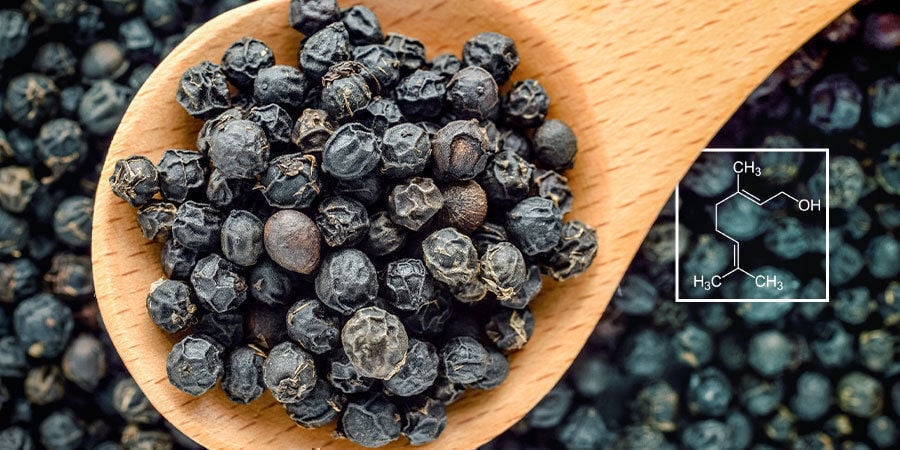
Can Black Pepper Help Manage the Effects of Cannabis?
Both black pepper and cannabis contain the terpene and dietary cannabinoid beta-caryophyllene. This molecule activates the CB2 receptor of the endocannabinoid system and produces relaxing and soothing effects. When you're too high, a dose of this terpene might just bring you back down to Earth. Discover strains high in the molecule below.
Black pepper and cannabis seem like two entirely unrelated plants. Yet, though one gets you high and the other adds spice to your food, the two actually share more in common than you might think. Just like cannabis, black pepper contains cannabinoids—molecules that interact with the endocannabinoid system.
Before you think about rolling some black pepper up into a joint, note that this spice won’t get you high. Instead, a terpene found within black pepper might actually reduce the psychotropic effects of THC. This can come in handy when you’ve smoked a bit too much, or when you want to limit the effects of the psychotropic cannabinoid during daily tasks.
Below, we'll break this relationship down further, and provide some suggestions for cannabis strains rich in the black pepper-derived terpene beta-caryophyllene.
What Is Black Pepper?
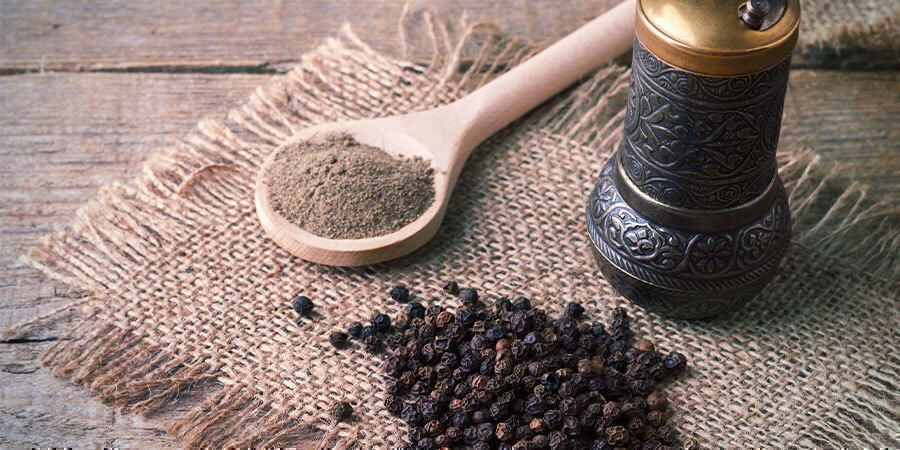
Most people know black pepper as a spice that—along with salt—adds a nice punch to just about every savoury dish imaginable. The peppercorns found in spice grinders come from an herb known as Piper nigrum.
Native to South India, Piper nigrum belongs to the Piperaceae family. The flowering vine produces broad leaves and long, narrow flowers that bear peppercorns as fruit. After drying, these small nuggets of spice make their way to almost every kitchen cupboard in the world, before being processed into small granules above our dinner plates.
Humans have utilised black peppercorn since antiquity to flavour foods and as a holistic herb. For example, the ancient Indian system of Ayurveda views black pepper as the “king of spices”. The system considers the herb a pungent substance that stimulates the digestive fire.
Why Black Pepper Is Good for You

Far from a mere flavouring, black pepper features an array of beneficial properties. Check out some of the main reasons to include ground pepper in your diet below.
Antioxidant
Black peppercorn boasts high levels of antioxidants. These molecules course through the bloodstream and neutralise free radicals, rogue molecules that cause DNA damage through oxidation.
Soothing
Black ground pepper may help to soothe the gut by promoting the growth of friendly bacteria. These small critters help us get the most out of our food.
Cholesterol
We all know the detrimental effects of too much cholesterol. Black pepper may help to reduce cholesterol levels, including LDL—the bad kind.
Stimulates Digestion
Just as the ancient Ayurvedic practitioners stated back in the day, black pepper appears to stimulate digestion and ramp up the absorption of other beneficial molecules found in turmeric and green tea.
Memory
Adding ground pepper to your food might do your neurons a favour. A mouse model of induced neurotoxicity found black pepper to have memory-enhancing potential, making it an intriguing subject for future research.
The Science Behind Terpenes
Terpenes are aromatic hydrocarbons that occur throughout the plant kingdom. These molecules are responsible for the scents experienced when peeling an orange or strolling through a pine forest. Approximately 20,000 terpenes exist in nature, and 200 are produced in the trichomes of cannabis plants.
In plants, terpenes play the role of secondary metabolites. They aren’t involved in the growth or reproduction of the organism. However, they serve to deter pest insects, attract beneficial species, and protect against environmental stressors such as excess heat.
Terpenes are major players when it comes to the unique effects of cannabis strains. These aromatic molecules synergise with cannabinoids such as THC and CBD—a mechanism known as the entourage effect—to enhance their effects. Terpenes also offer properties of their own. Myrcene, for example, produces a relaxed state of mind, whereas limonene refreshes and energises.
What Is Beta-Caryophyllene?
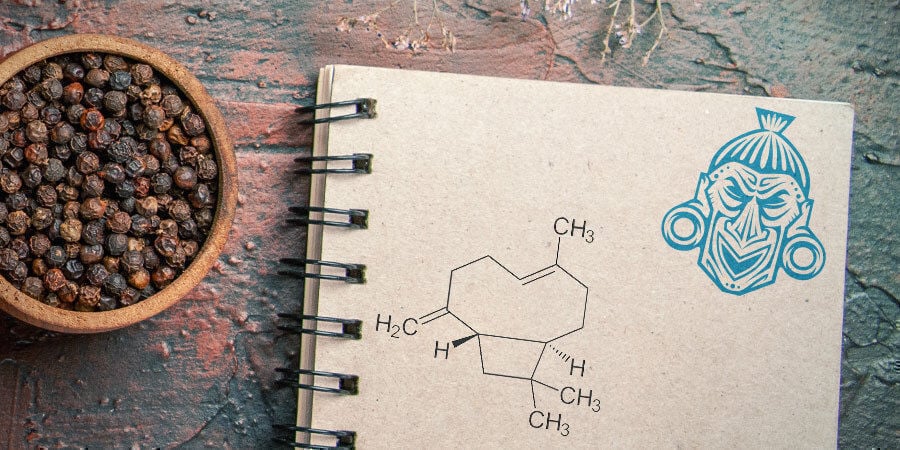
Beta-caryophyllene is a phytocannabinoid-terpenoid. This means that when consumed by humans, it binds to endocannabinoid system receptors and plays the role of a cannabinoid alongside THC, CBD, and other molecules.
Cannabinoids share a similar molecular structure with endogenous cannabinoids, such as anandamide. Such similarity allows them to activate, block, or decrease the activity of cannabinoid receptors. Many cannabinoids achieve their actions through this mechanism. For example, THC produces psychotropic effects by binding to the CB1 receptor and increasing its activity. In contrast, CBD works to block the same receptor.
Beta-caryophyllene earned its cannabinoid status through its ability to bind to the CB2 receptor and increase its activity—the mechanism that underpins the unique effects of the molecule. Notably, beta-caryophyllene occurs as the most common terpene found in cannabis extracts. Other food sources, such as hops, cinnamon, cloves, and rosemary, also contain the chemical, prompting scientists to refer to the chemical as a dietary cannabinoid.
As well as exerting its own action on the endocannabinoid system, black pepper appears to change how other cannabinoids affect this body-wide network. In particular, it may modulate the psychotropic effects of THC. By binding to the CB2 receptor, beta-caryophyllene induces a relaxing effect. During the throes of panic and paranoia that arise after smoking too much weed, this terpene might save the day. In that way, beta-caryophyllene is analogous to CBD in its ability to alter THC's psychotropic threshold.
The strategy of chewing on black peppercorns during a weed-induced panic attack has made its way around the cannabis community for decades. Now, science has started to confirm this idea. By modulating the endocannabinoid system through an entirely different receptor, beta-caryophyllene may help to level out the mind.
Cannabis Strains Containing Beta-Caryophyllene
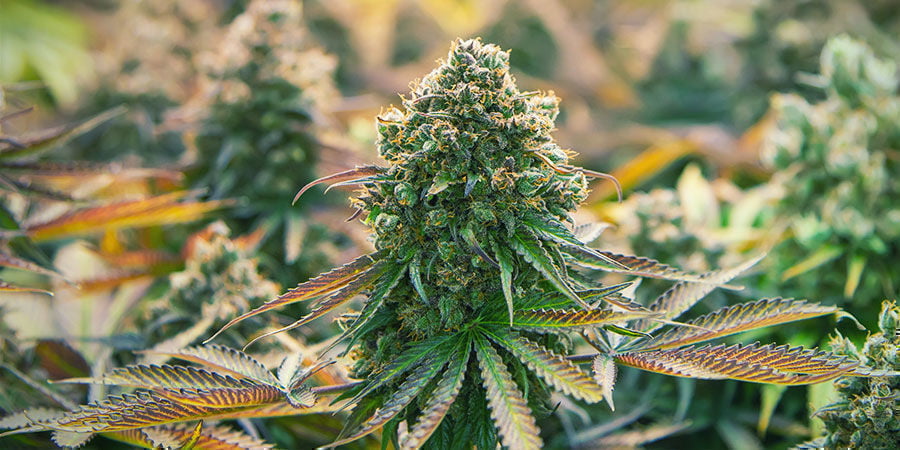
Beta-caryophyllene occurs in the vast majority of cannabis strains, and in high quantities. However, the strains below feature exceptionally large amounts of the terpene. If you’re looking to fire up your CB2 receptors and experience a deeply relaxing high, put these buds in your next bowl or blunt.
Jack Herer Automatic
Named after the legendary cannabis author and activist, this strain remains a tribute to those that have changed the way the world perceives weed. Jack Herer Automatic produces dense and sticky flowers coated with productive trichomes. These small glands churn out high quantities of beta-caryophyllene and a THC level of 16%. A CBD level of 3% also contributes to the chilled-out effect of this strain. Smoke these buds in the evening to forget about your worries, erase tension, and enter a relaxed and meditative state. After placing these seeds in the soil, you’ll only have to wait 8–10 weeks before harvesting your own personal stash.
Black Domina
Black Domina contains some of the highest beta-caryophyllene levels of any strain. The terpene contributes heavy aromas of earthiness and pepper, making these flowers a superb option when crafting savoury edibles in the kitchen. Her indica dominance and high levels of THC mean she hits hard, but her relaxing terpene profile keeps things under control. Enjoy her on lazy afternoons when you have nothing planned but to zone out and chill.
Everything in Moderation — Cannabis Included

Using this pepper-derived terpene can help when you've indulged in a bit too much THC. But, if you experience uncomfortable side effects from cannabis, you need to examine how often you’re using the herb. Although it offers amazing experiences, users should maintain moderation. If you think you’re overdoing things, consider taking a break. When you return to smoke again, you’ll likely experience the positive side of the herb once more. And, for those times when the high gets a little too high indeed, consider black pepper or strains loaded with beta-caryophyllene.
- (n.d.). (PDF) Memory Enhancing Effect of Black Pepper in the AlCl3 Induced Neurotoxicity Mouse Model is Mediated Through Its Active Component Chavicine - https://www.researchgate.net
- Ethan B Russo. (2011, August). Taming THC: potential cannabis synergy and phytocannabinoid-terpenoid entourage effects - https://www.ncbi.nlm.nih.gov
-
 6 min
March 17, 2025
What to do when you're too high on cannabis
We all get too high sometimes. It par for the course. However, it can help to know what to do when we get into this state, and knowing how to avoid it in the first place is vital knowledge, too.
6 min
March 17, 2025
What to do when you're too high on cannabis
We all get too high sometimes. It par for the course. However, it can help to know what to do when we get into this state, and knowing how to avoid it in the first place is vital knowledge, too.
-
 5 min
January 27, 2022
The Surprising Benefits Of Combining Cannabis And Hot Peppers
Cannabis chills out the body and the mind. Peppers, in contrast, send a jolt through the central nervous system and wake up the senses. However, despite their differences, these two plant species...
5 min
January 27, 2022
The Surprising Benefits Of Combining Cannabis And Hot Peppers
Cannabis chills out the body and the mind. Peppers, in contrast, send a jolt through the central nervous system and wake up the senses. However, despite their differences, these two plant species...
-
 7 min
May 31, 2021
Top 10 Mellow Cannabis Strains
THC is great, but too much of it can be overwhelming for some people, or in situations where you need to stay focused and productive. Keep reading to discover the perfect mellow cannabis...
7 min
May 31, 2021
Top 10 Mellow Cannabis Strains
THC is great, but too much of it can be overwhelming for some people, or in situations where you need to stay focused and productive. Keep reading to discover the perfect mellow cannabis...
-
 5 min
January 22, 2021
What Are Flavonoids, Terpenes, And Terpenoids?
Cannabis flowers appear simple to the naked eye. Yet, these sticky green nuggets house a secret, complex world. Not only do they contain over 100 cannabinoids, but they manufacture hundreds of...
5 min
January 22, 2021
What Are Flavonoids, Terpenes, And Terpenoids?
Cannabis flowers appear simple to the naked eye. Yet, these sticky green nuggets house a secret, complex world. Not only do they contain over 100 cannabinoids, but they manufacture hundreds of...
-
 5 min
January 19, 2021
Top 3 Cannabis Strains By Terpenes
Do you know your pinene from your linalool? How about your myrcene from your limonene? Sure, terpenes are responsible for the tastes and smells of weed, but they also directly influence the effects...
5 min
January 19, 2021
Top 3 Cannabis Strains By Terpenes
Do you know your pinene from your linalool? How about your myrcene from your limonene? Sure, terpenes are responsible for the tastes and smells of weed, but they also directly influence the effects...
-
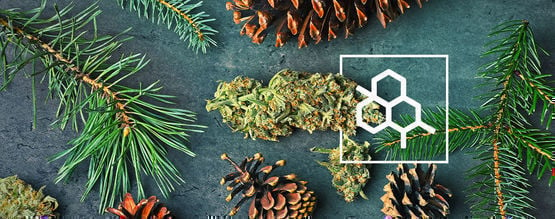 4 min
May 30, 2018
Everything You Need To Know About Terpenes
If terpenes and terpenoids sound the same to you, that's because, for the most part, they are. But there is a small difference between these two compounds; terpenes are pure hydrocarbons....
4 min
May 30, 2018
Everything You Need To Know About Terpenes
If terpenes and terpenoids sound the same to you, that's because, for the most part, they are. But there is a small difference between these two compounds; terpenes are pure hydrocarbons....











 United States
United States

